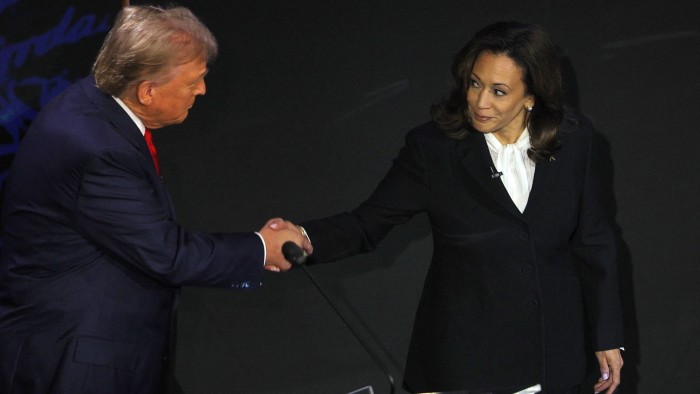There are many, many things to say about why Donald Trump will be president again and what it tells us about America (for my first stab at this, see my Monday column). One of the rare silver linings of his second term is that it will undoubtedly provoke another four years of great journalism, and perhaps even higher subscription rates for newspapers, as it did the first time round.
But in this note, I want to tackle not the “Meaning of Trump” but the crucial question of why Kamala Harris lost. I am having a hard time writing this, because for me, it chimes too tragically with 2016 in the sense that the seeds of Democratic defeat were evident in the first presidential debate of that election cycle.
Back then, I remember watching Hillary Clinton square off against Trump from the Upper West Side apartment of some progressive friends, where everyone present predictably thought she was winning. I, on the other hand, started to feel a vague sense of nervousness when the topic of Nafta came up. It was the sort of feeling you get when you are at work or a dinner party and someone has said something oddly triggering and you get a little jolt in your stomach or twinge in your back. You know whatever has come up is indicative of some deeper issue.
In the debate, Trump called Clinton out on the trade deals her husband had backed, and she just had nothing much to say in return. She was just caught out and backhanded by the truth, which is that the Clintons were part of the wing of the Democratic party that had decided that factory jobs weren’t worth protecting without having any sort of clear national debate about it. (This kind of ju-jitsu is, of course, one of Trump’s rare and diabolical skills — to find the nugget of deceit or subterfuge or wilful blindness or self-deception on the part of his opponent and make hay with it. I guess his skill in the dark arts of deception must help with that).
It said something about where Clinton stood on trade policy. But it also said something much more important about her lack of understanding about the yawning gap that had opened up between the felt experience of working people in the US, and where progressives thought economic policy should be.
So, it was kind of stunning to me that Harris, in the first few minutes of her only debate with Trump, committed not a forced error, but an own goal around the same topic. Unprovoked by her opponent, she raised the issue of tariffs as a “Trump tax”. She used this as a way of getting into the key Democratic argument that Trump would be a disaster for the economy because his broad-based tariff plan would stoke inflation — which was, of course, already the main economic worry for most Americans.
Let’s put aside Harris’s strategic error of introducing the issue of inflation herself. Let’s focus instead on how voters in Pennsylvania and Wisconsin would have heard that comment. They would not have focused on the word inflation. They would have focused on the word tariff. And by decrying tariffs in that way, Harris would have immediately been interpreted as coming from the usual neoliberal economic camp that sold working people in manufacturing (and indeed, many services) down the river over the past two decades.
What should she have done? I will be resolutely contrarian and stick with what I said all along, which is that she should have put LESS, not MORE, space between herself and Joe Biden in terms of economic strategies. I don’t mean that she should have used the word Bidenomics, which many progressives (like myself) never really loved as a way of describing a political economy shift that is much bigger than one president.
Rather, she should have shown up immediately in the places that Scranton Joe won back from Trump in 2020, and made it totally clear that she was with working people. That she had their backs. That she would use every tool in the economic toolbox — including tariffs when and where appropriate — to protect American jobs.
She should have reached for a much deeper systemic understanding of this moment in our political economy, and made it clear that not only would America continue to build back better, but that her administration would tax assets and the asset-owning class; that they would use the proceeds to buffer the temporary pain of pandemic-era inflation still being borne by working people. This would have been the way to message a larger policy commitment to continuing to move the US economy away from its over-reliance on asset inflation, debt and consumption, and towards a better mix of income-led growth, production and resilience.
Obviously, she didn’t do any of that. I stand by my three columns about Harris and her campaign, which raised the worries that she would align with crypto titans, Silicon Valley billionaires, and miss — like every Democrat in recent years aside from Biden — the deep feeling of being sold out that would dictate how crucial swing state voters cast their ballots. Fool me once, shame on you. Fool me twice . . . well, you know.
For more on this and my and FT Washington bureau chief James Politi’s thoughts on the race and what happened, tune into this week’s Swamp Notes podcast.
Peter, no need to rebut — I know you won’t agree. So, my question to you is — what is your number-one reason why Kamala lost?
Recommended listening and reading
What are the opportunities and challenges facing dealmakers in 2025? Join us on November 20 for a free webinar on the global M&A outlook for the Americas for insight from the FT’s US private and institutional capital correspondent Antoine Gara and industry experts at JPMorgan, Sullivan & Cromwell and more.
Peter Spiegel responds
Rana, I agree that the primary dynamic in the election was economic, but I take a very different angle on whether there was anything Harris could have done to measurably change the final result. The most compelling bit of analysis I’ve read about the election is from our own John Burn-Murdoch, who noted that the Harris-led Democrats are just the latest in an unprecedented anti-incumbent wave that has gripped liberal democracies the world over.
He tracked elections in 10 different large countries in 2024 and noted that incumbent parties in all of them either were thrown out of office or saw significant decline in vote share. “This is the first time this has happened in almost 120 years of records,” John wrote.
The list of losers — or at least vote-share losers — is long and growing. Rishi Sunak and his centre-right Conservatives in Britain; Emmanuel Macron and his centrist Ensemble in France; Narendra Modi and his nationalist BJP in India; the long-ruling Liberal Democrats in Japan. I suspect we’ll soon add to that list Olaf Scholz and his centre-left Social Democrats in Germany.
I think we’ve all underestimated the economic dislocation that came with the pandemic, one that only exacerbated a feeling of financial insecurity that was building in most liberal democracies following the global financial crisis of 2007-2008. In recent days, John’s work has been repeatedly cited back to me by fellow editors at rival news organisations and even the host of a podcast I was on last week.
I’m not as sure as you are, Rana, that there has been a fundamental change in the ideological or policy outlook of the American public, one that has made statist economic intervention more politically popular. I just think the American voter is angry. They ejected the incumbent party in 2016, again in 2020, and now again in 2024. Having parties change hands in the White House three times in three elections last happened in the 19th century.
That is not an argument for complacency. One of the most troubling aspects of the west’s political dialogue since the 2007 financial crisis is the failure of the centre to come up with a compelling economic message that can counter both the nationalist right and the anti-capitalist left. Whoever can pull that policy platform together could have a very successful political career ahead of them.
Your feedback
And now a word from our Swampians . . .
In response to “Time to close America’s bureau of wishful thinking”:
“Chuck Schumer’s happy calculus that for every blue-collar vote the Democrats lost they would gain two in the suburbs turns out to be illusory. Alas, the Democrats not only lost the working class but the suburbanites were no-shows.” — Trevor Rowe
“I think the progressive left’s robust, uncompromising and aggressive tactics were their blind spot and a factor in propelling Trump to power. Their hearts and minds were in the right place, but wrong strategy in getting their ideas across. It was a big gift in helping Trump get such a big majority. Unless there is more perception of this blind spot, I feel, ironically, the very minorities they are trying to represent will become increasingly Republican voters and, rather foolishly vote in a president who does not have their interests at heart.” — FT Commenter Donald Tenant
Your feedback
We’d love to hear from you. You can email the team on swampnotes@ft.com, contact Ed on edward.luce@ft.com and Rana on rana.foroohar@ft.com, and follow them on X at @RanaForoohar and @EdwardGLuce. We may feature an excerpt of your response in the next newsletter
Source link









